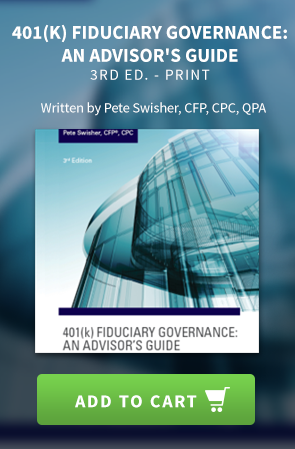State Sponsored Plans
State-run retirement plans that provide coverage for private-sector employees whose employers do not are intended to help those employees to set the foundation for a more financially secure retirement. But they also can help with bigger-picture concerns, suggests an industry expert.
Important in...
READ MORE
An increasing number of states are crafting and implementing retirement programs for employees whose employers do not offer one. All of them are new, but an industry insider discusses some of the states that have forged ahead on something newer than new.
Chad Parks, Founder and CEO of Ubiquity...
READ MORE
The California Senate has approved two bills relevant to retirement plan coverage in California and has advanced them to the state Assembly.
Expanding CalSavers
SB 1126, a measure that would expand the definition of “eligible employer” for purposes of the CalSavers Retirement Savings Trust Act—...
READ MORE
We’ll pass on that, the U.S. Supreme Court said when asked to review a ruling on a challenge to the legality of CalSavers, California’s state-run retirement plan for private-sector employees whose employers do not offer one. Congress should take the hint, suggests a recent analysis, and let the...
READ MORE
A program administrator and investment manager have been named for RetirePath Virginia, the state-run program that will provide retirement plan coverage to Virginians whose private-sector employers do not, as it approaches the July 1, 2023 launch date.
Then-Gov. Ralph Northam (D) on May 7, 2021...
READ MORE
The First State is poised to join its sister states that provide a state-run retirement plan.
By a 35-1 margin, the state House of Representatives passed legislation May 17, 2022 to create the Delaware Expanding Access for Retirement and Necessary Savings (EARNS) program, which is intended to...
READ MORE
The CalSavers Retirement Savings Board and New Mexico State Treasurer’s Office have announced that they are seeking service providers for aspects of their operations in providing retirement plan coverage to employees in their states whose employers do not.
CalSavers
The CalSavers Retirement...
READ MORE
A bill is before the California Senate that would expand CalSavers, the state-run retirement plan that provides coverage to those whose employers do not, to cover almost all employers in the Golden State.
SB 1126, introduced by Sen. Dave Cortese (D-Santa Clara), would expand the definition of “...
READ MORE
The Aloha state is poised to set in motion a state retirement plan that would be unique among its counterparts—employees would have to opt in, and a retiree would be among the members of the board administering the program.
On May 3, the Hawaii Senate and House of Representatives both voted in...
READ MORE
Less than two months remain for employers with five or more employees in the Golden State to register with CalSavers, the state-run retirement plan for those whose employers do not offer one.
CalSavers, enacted in 2012 but not launched until July 1, 2019, has required employers to either begin...
READ MORE
Vestwell has been selected as the vendor that will administer the Colorado Secure Savings Program and New Mexico Work and $ave, the state-run retirement plans that provide retirement plan coverage for employees in those states whose employers do not.
Vestwell announced that it won a competitive...
READ MORE
OregonSaves, the state-run program which provides employees in the Beaver State with retirement benefits if their employers do not, was the first such program to begin operating in the United States. A recent study assessed how well it is doing, and researchers have some good news for its advocates...
READ MORE
CalSavers, the program in the Golden State that provides retirement plan coverage for those whose employers do not, has been in operation for three years now. Employers have a key role in how the program works; how are they responding?
CalSavers was launched in 2019, and the first of three waves...
READ MORE
Connecticut Comptroller Natalie Braswell announced March 24 the launch of MyCTSavings, the state-run retirement savings program intended to provide coverage for private-sector employees whose employers do not offer them a plan. A pilot was launched in September 2021.
MyCTSavings is mandatory for...
READ MORE
Despite a request—and an apparent consideration of that request—the nation’s highest court has decided not to take on a case challenging the CalSavers state-run IRA program for private sector workers.
The original suit, filed in the U.S. District Court for the Eastern District of California in...
READ MORE
CalSavers, the state-provided retirement plan for employees whose employers do not provide one, was launched on July 1, 2019. Now, more than two and a half years later, where does it stand?
Registration
Registration was set to take place in three waves:
Wave 1: Employers with more than 100...
READ MORE
The CalSavers Retirement Savings Board, the body that runs CalSavers, the state-provided retirement plan for employees whose employers do not provide one, on Feb. 18 issued a request for proposals (RFP) for a new investment option focused on ESG factors.
The Board seeks proposals from qualified...
READ MORE
CalSavers, the state-run retirement plan for employees whose employers do not provide a plan, had a 2021 befitting a plan created and run by a place called the Golden State.
In an annual report about CalSavers, the CalSavers Retirement Savings Board reports that by many measures the plan grew,...
READ MORE
In the first six days of 2022, measures were introduced in three state legislatures that would establish retirement plans run by the state, or by third parties with which the state establishes a contract. Shortly after, a fourth measure was introduced to bolster a recently established state plan...
READ MORE
CalSavers is getting ready to impose penalties on employers with more than 100 workers with no retirement plan who haven’t registered—and it’s not cheap.
Employers that do not offer a private retirement plan and who have more than 100 employees have been urged to immediately comply with state law...
READ MORE


